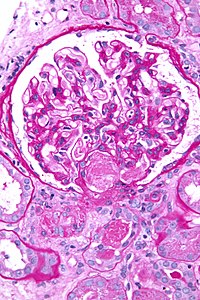
Photo from wikipedia
Preanalytical quality control of blood samples is critical for tests of coagulation function and coagulation factor activity. Preanalytical storage time and temperature are the main variables. We investigated the effects… Click to show full abstract
Preanalytical quality control of blood samples is critical for tests of coagulation function and coagulation factor activity. Preanalytical storage time and temperature are the main variables. We investigated the effects of preanalytical frozen storage time and temperature on activated partial thromboplastin time (APTT), fibrinogen (Fbg), prothrombin time (PT)/international normalized ratio (INR), thrombin time (TT), factor VIII activity (FVIII:C), and factor IX activity (FIX:C) in frozen plasma. Samples (n = 144) were randomly and equally divided into four groups (storage at −80 °C or −20 °C) and analysed by CS5100 or CA7000 coagulation analysers. Baseline values and results after storage for 15 days, 1 month, 3 months, 6 months, and 1 year were measured after thawing. Mean percent changes and scatter plots were used to determine clinically relevant differences. The stabilities of coagulation tests and coagulation factor activities measured by the CS5100 system were consistent with those measured by the CA7000 system. At −80 °C, assessment samples of PT/INR, Fbg, and TT can be safely stored for 1 year, APTT for 6 months, and FVIII:C and FIX:C for 1 month. At −20 °C, samples of Fbg and TT can be stored for 1 year, PT/INR and FIX:C for 1 month, and APTT and FVIII:C for 15 days.
Journal Title: Scientific Reports
Year Published: 2017
Link to full text (if available)
Share on Social Media: Sign Up to like & get
recommendations!